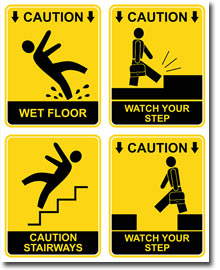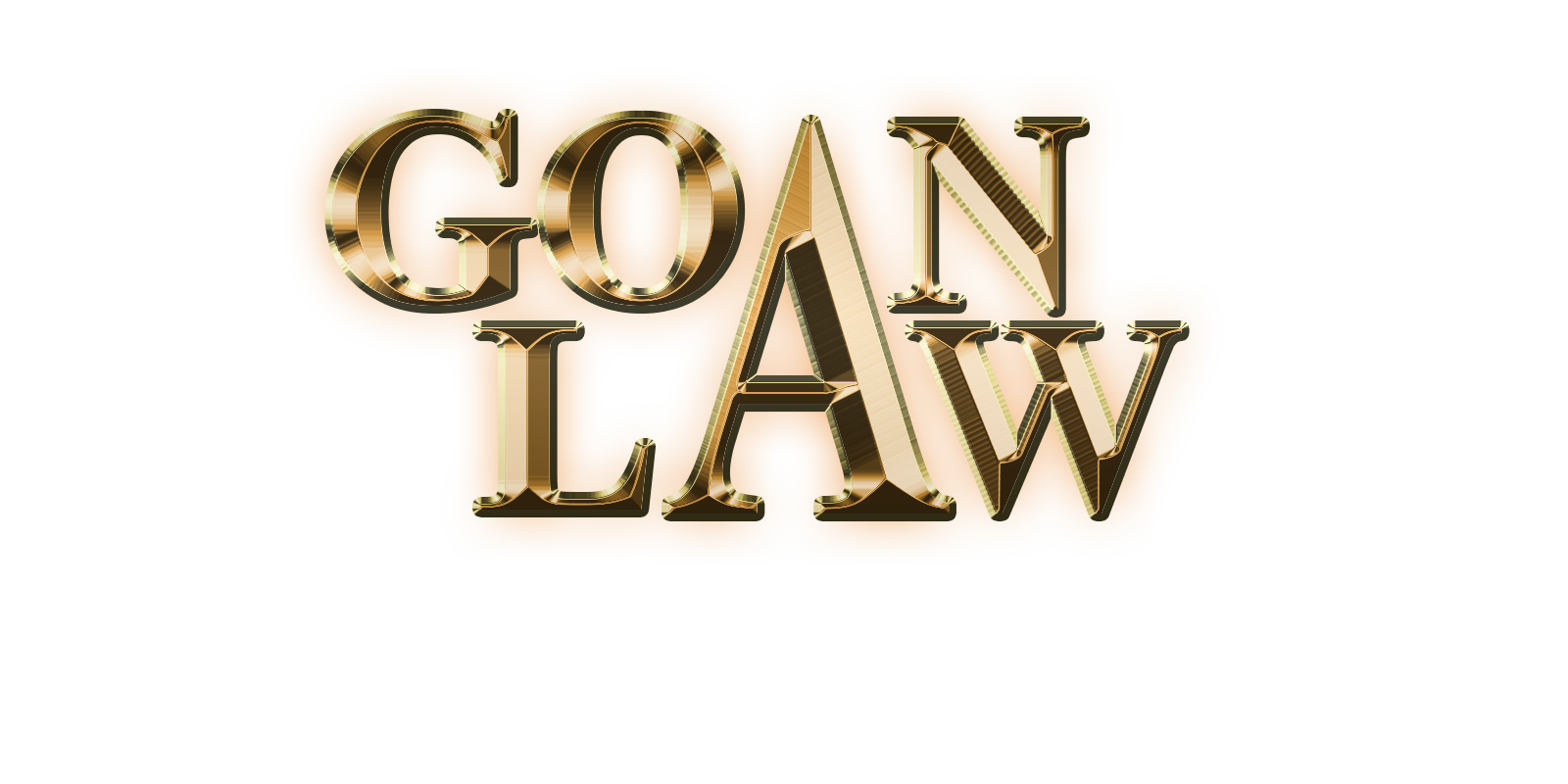Premises Liability Accidents
Timothy M. Goan Esq.Helping those in need

Dangerous and Unsafe Premises
No doubt you’ve seen the signs warning you to be cautious and to stay away: “Caution-Wet Floor” and “Beware of Dog” or “DANGER-Keep Out.”
In addition to alerting you to potential hazards and preventing possible injuries, these types of signs serve an additional purpose: to protect the property owner from liability.
In Florida, the issues involved with premises accident liability are complicated, and just putting up a sign does not always relieve the owner or controller of the property from their responsibility to keep their premises safe and secure.
Types of Premises Liability Cases
Premises liability cases can include accidents involving slip-and-fall, trip-and-fall, broken glass, swimming pools, dog bites and animal attacks, explosions and fires, roof and structural collapses, defective store displays, negligent security, and among others.
These types of accidents occur everyday in various locations, including malls, retail stores, hotels and motels, amusement parks, theaters, sports facilities, gyms and health clubs, office buildings, marinas, parking lots and construction sites, as well as private homes, boats and RV residences.
The owners of these locations have a legal duty under Florida law to take all necessary steps and precautions to keep their property safe from dangerous and unsafe conditions. This means potential hazards that are known or that should have been known.
But it’s not always the owners of the property who have the sole obligation to safeguard it. Those who are in control of the premises can be primarily responsible or share in that responsibility with the owner. This would apply in the case of an occupier of the property or a tenant.
This “controller” owes different duties of care to the people entering or visiting the premises, depending on the circumstances and purpose of their visit.
Are they visiting for business, for social reasons, or are they trespassing? Let’s delve into some of the distinctions.
Accidents
- Bicycle Accidents
- Boat / Jet Ski Accidents
- Bus Accidents
- Car Accidents
- Dangerous Roadways
- Defective Vehicles
- Motorcycle Accidents
- Plane Crashes
- Train Accidents
- Truck Accidents
Catastrophic Accidents
- Brain Damage
- Burn Injuries
- Loss of Limb / Disfigurement
- Paralysis / Spinal Cord Injuries
- Wrongful Death
Medical Malpractice
- Birth Injury
- Cerebral Palsy
- Defective Medical Devices
- Medication Mistakes & Dangerous Drugs
- Nursing Home & Elder Abuse
Premises Accidents
- Construction Injuries
- Dog / Animal Bites
- Horse Accidents
- Pedestrian Accidents
- Premises Liability
- Slip & Fall
- Swimming Pool Accidents
Business Invitee
If you are shopping at your local grocery store, watching a football game at the sports stadium, or enjoying your favorite theme park, then your visit would fall under the category of a “Business Invitee.”
The owner/controller of these types of properties needs to give the highest level of care to you. They are required to conduct regular inspections to locate and correct any dangerous conditions, such as slippery or uneven surfaces, unstable structures, hazardous material, or merchandise that has fallen on the floor or has the potential to fall.
This duty to inspect means that the controller can be found liable for injuries that happen due to dangerous conditions they know about and should know about.
Licensee
When you’re invited to a friend or family members’ home for a social gathering, such as a birthday party, anniversary celebration, religious function, or holiday gathering, your visit would fall under the category of “Licensee.”
There is a duty on the part of the owner and/or property controller to maintain the premises and repair anything that is unsafe and could cause harm to you or others. This would include the obligation to make you aware of any known dangers on the premises.
Trespasser
While you may not consider yourself one of these, if you take a shortcut across someone’s property without their permission to reach an adjacent property, you fall into the visitor status of “Trespasser.” Those who are idling with no apparent purpose also fall into this category, as does the intruder whose intent it is to steal or cause damage to the property.
Interestingly enough, even though these people (including you in the example above) have not been invited on the property, and may in fact mean to cause harm, they are still all entitled to some degree of protection. The owner or controller of the property must refrain from any willful or reckless intent to injure the Trespasser, such as setting a concealed trap or a trip wire that triggers a weapon or instrument that can cause bodily harm.
Children Are Special
Children are naturally curious, but often lack the judgment necessary to assess danger in many situations. Florida’s “Attractive Nuisance Doctrine,” which is an important subcategory of the law covering premises liability, serves to protect small children and keep them safe.
Whether an invited guest or a trespasser, a child needs to be protected from conditions that may cause them harm, and it is the special duty of the property owner and/or controller to do just that.
This means taking reasonable steps to safeguard or remove potentially dangerous items on the premises, like old appliances and trampolines, machinery that might be tempting to climb, or riding mowers and other vehicles that a child may try to drive.
One of the most attractive “nuisances” to a child, and frequently the most dangerous and deadly, is a swimming pool. The reasonable steps a controller or owner of the property should take are to enclose the pool in a secured screenhouse, as well as put up a fence with a locked gate.
Unfortunately, these are often not enough to protect a determined child, especially in the case of unattended pools where the homes may have gone into foreclosure and have since been abandoned.
Determining who is liable in such a situation has proven to be intensely frustrating for parents of drowned children across the country, as more and more frequently, neither the banks, the former owners, nor the cities have a clear legal responsibility in many cases.
Premises Accident Liability Issues Are Complicated
Effective handling of premises accident cases requires comprehensive investigating and an understanding of the facts and circumstances as they relate to Florida law.
For someone not trained in legal matters, it may appear to be obvious where and with whom fault lies. But the issues of premises liability are complicated, with overlapping laws, ordinances, and established standards that define how property owners must meet certain levels of safety and security. Making a determination as to which of these applies to a specific case and where the legal responsibility lies are what an experienced attorney needs to sort out and identify.
Accident Attorney Tim Goan has that experience, along with an understanding of the emotional toll that serious and fatal injuries can have on survivors and family members, as well as the financial losses and unyielding desire for justice.
Contact Experienced Personal Injury Attorney Tim Goan
The Law Firm of Timothy M. Goan, P.A. represents accident, personal injury, and wrongful death victims in Palm Coast, Flagler Beach, Ormond Beach, Daytona Beach, Palatka, and St. Augustine, as well as Flagler County, Volusia County, Putnam County, St. Johns County, and beyond.
With over two decades of experience, and a Zero-Fee Guarantee, Personal Injury Attorney Tim Goan is dedicated to getting you the best financial compensation, so you can pay your bills, provide for your loved ones, and move on with your life following a serious accident.
Zero-Fee Guarantee and the Goan Advantage
If a loved one has died, or you or a family member has been injured due to premises negligence, Attorney Goan is ready to help. Call or send an email to schedule an appointment today.
With an office centrally located in Flagler County’s Palm Coast, you’re not that far away from getting the legal solutions you need to seek compensation for your physical injuries from someone else’s negligence.
